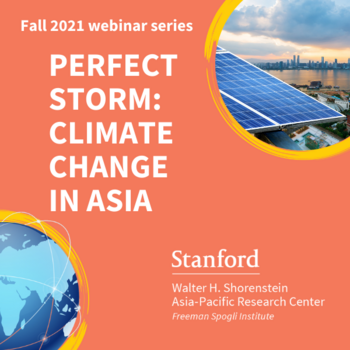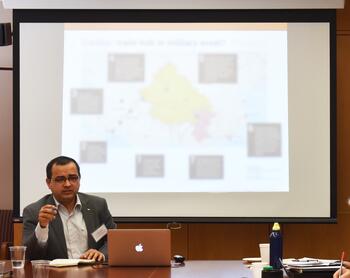There is an important consideration on Korea’s journey toward carbon neutrality: nuclear energy. Although Korea should eventually phase out its nuclear power plants, carbon neutrality is virtually impossible without reliance on nuclear energy. Due to geographic factors, Korea cannot generate enough energy from renewable energy sources. Instead of phasing out nuclear power, Korea has to substantially increase its use of nuclear energy if it hopes to attain carbon neutrality.
Nonetheless, the Moon Jae-In administration abruptly pursued a nuclear phase-out policy for most of its term. It halted construction on nuclear power plants and prematurely shut down an operational power plant that had passed safety inspections. At the same time, it provided substantial subsidies for solar power installations. Shortly before leaving office, however, Moon stated on February 25, 2022, that Korea must “sufficiently utilize nuclear power plants as a major source of energy for the next 60 years.” He also urged relevant agencies to “take all necessary steps to hasten the operation” of four nuclear power plants whose construction had been delayed.26 In the end, Korea lost precious time due to incoherent and ill-advised policies.
The Yoon administration is right to proclaim carbon neutrality as a policy objective and emphasize the importance of energy security. It appears that the Russia-Ukraine War and global supply chain disruptions have influenced the administration’s thinking. At a June 2022 public hearing on the new administration’s energy policies, Director-General Cheon Yeong-Gil, the MOTIE official responsible for energy transition policy, stated that “it is becoming increasingly important to pursue both carbon neutrality and energy security, as Russia’s invasion of Ukraine is becoming protracted.”27 The United States, the United Kingdom, and other advanced economies are reconsidering the specifics of their energy policy, while maintaining the overarching goal of carbon neutrality. Korea must formulate a comprehensive policy that accounts for environmental concerns and energy security.
Fostering Scholarship and Leadership
Climate change and the energy crisis cannot and should not be addressed by governments alone. Academia and the private sector have important roles to play in convening groups of experts, calling upon citizens to act, and fostering international cooperation. Universities in the United States, Japan, and China are beginning to establish institutions that address climate change and energy issues. Prominent examples include Stanford’s Doerr School of Sustainability, which opened its doors last September; Tokyo University’s Center for Climate Solutions; and Tsinghua University’s Institute for Sustainable Development Goals. Several Korean universities, including Ewha Womans University and KAIST, have also taken steps in this direction. The government and the private sector should do everything they can to support these initiatives. Such institutions will prepare today’s youth to respond to the challenges posed by climate change and the energy crisis.
Korea’s companies must take a farsighted view in supporting institutions that discuss and address issues of global importance. Think tanks such as the Asan Institute for Policy Studies and the Chey Institute, both established with private support, are playing an active role in policy discussions. However, their budgets are relatively small, and they do not comprehensively engage with fundamental issues of global importance. It is hard to find Korean equivalents of the Gates Foundation or the Zuckerberg Initiative, in which a company’s founder donates a large part of their wealth toward addressing global issues—poverty, public health, education, climate change, and energy. While Samsung operates Samsung Global Research, it must do more to support research on long-term global issues in a way befitting of its status as a global company.
Moreover, Korea has Ban Ki-Moon, who oversaw the establishment of the SDGs during his tenure as UN secretary-general. He continues to actively engage with a variety of global issues abroad, but his experience and expertise are underappreciated at home. Korea can do more to play a leadership role on international issues, and climate change and energy issues present a valuable opportunity. Ban could play a meaningful role in advising, facilitating, or overseeing such efforts.
Last October, the Shorenstein Asia-Pacific Research Center partnered with the Ban Ki-Moon Foundation to launch the Trans-Pacific Sustainability Dialogue. This forum seeks to convene scientists, experts, and policy practitioners from across the Asia-Pacific for an annual discussion to identify avenues for cooperation and foster a new generation of leaders. The inaugural dialogue addressed climate change, and this year’s dialogue will be held in Seoul on the topic of energy security. It is my hope that Korea will host many such international conferences in the years to come, as a way for Korea to exercise leadership on the international stage.
Just Look Up!
A comet several miles wide is hurtling toward Earth. If nothing is done, humanity will go extinct. However, most people question or deny the existence of this comet. As the comet finally becomes visible in the sky, some begin to cry “just look up!” Anyone can look up and see the truth for themselves. Even so, others refuse to recognize this reality. They claim that this object is not a comet, and they shout “don’t look up” instead. This is the plot of the movie "Don’t Look Up," released in 2021.
The Earth will be destroyed in less than six months, but the wealthy collude with the powerful to profit from the impending extinction of humanity. They claim that the comet is full of valuable raw materials. Later on, they detonate the moon in an unsuccessful attempt to block the comet. As a means of last resort, they escape Earth to reach a faraway planet, where they die at the hands of the alien population. The vast majority of people on Earth have no choice but to hold each other’s hands and pray as they await their fate.
It cannot be emphasized enough: climate change and the energy crisis are beginning to disrupt our everyday lives in tangible ways. The truth is in front of our eyes, but we should question if we are telling ourselves to not look up. In addition, the movie reminds us of the dire consequences when politicians and the wealthy collude to pursue their narrow self-interest. There is not much time left to confront and respond to the crises that are unfolding in plain sight. Perhaps no one can undo the Gordian knot overnight, but we should—at the very least—just look up.
1 Amanda Pitts and Michael Bartiromo, “Mt. Washington Records Coldest Wind Chill in US History,” The Hill, February 6, 2023. ↩
2 Alistair Nesbitt et al., “Climate Change Projections for UK Viticulture to 2040: A Focus on Improving Suitability for Pinot Noir,” OENO One 56, no. 3 (2022). ↩
3 Clarissa Wei, “The Arctic Circle: A New Frontier for Sustainable Wine,” BBC Travel, September 1, 2022. ↩
4 Roman Grüter, Tim Trachsel, Patrick Laube, and Isabel Jaisli, “Expected Global Suitability of Coffee, Cashew and Avocado Due to Climate Change,” PLOS ONE, January 26, 2022. ↩
5 Justin Worland, “Your Morning Cup of Coffee Is in Danger. Can the Industry Adapt in Time?,” TIME, June 21, 2018. ↩
6 Walter Strong, “Fort Smith Had Its Hottest Day in 80 Years: Preliminary Data,” CBC News, June 30, 2021.↩
7 Kasha Patel, “Rain Falls at the Summit of Greenland Ice Sheet for First Time on Record,” Washington Post, August 19, 2021, https://www.washingtonpost.com/weather/2021/08/19/greenland-melt-august….↩
8 National Oceanic and Atmospheric Administration, “BAMS Report: Record-High Greenhouse Gases, Sea Levels in 2021,” August 31, 2022. ↩
9 Josie Garthwaite, “Earth Likely to Cross Critical Climate Thresholds Even if Emissions Decline, Stanford Study Finds,” Stanford University, January 30, 2023. ↩
10 National Oceanic and Atmospheric Administration, “Dr. Rick Spinrad on COP26: Climate Crisis Not a Challenge for Future, but ‘One We Must Confront Today’,” November 1, 2021. ↩
11 National Oceanic and Atmospheric Administration, “Statement from NOAA Administrator Dr. Rick Spinrad on the IPCC Climate Change 2022 Impacts Report,” February 28, 2022. ↩
12 United Nations, “Secretary-General’s Remarks to High-Level Opening of COP27,” November 7, 2022. ↩
13 Giulia Carbonaro, “EU has Paid Russia $16 Billion for Fossil Fuels Since Ukraine War Started,” Newsweek, March 18, 2022. ↩
14 Sandor Zsiros and Jorge Liboreiro, “‘Russia Will Lose the Energy Battle,’ Says IEA Chief Fatih Birol,” Euronews, October 29, 2022. ↩
15 Gi-Wook Shin, “In Troubled Waters: South Korea’s Democracy in Crisis,” Shorenstein APARC, May 3, 2022. ↩
16 An English translation of the law by the Korea Legislation Research Institute is available at “Framework Act on Low Carbon, Green Growth,” Korea Law Translation Center. ↩
17 Global Green Growth Institute, “New Global Initiative Launches at COP21 to Boost Green Growth Financing,” December 7, 2015. ↩
18 Global Green Growth Institute, “New Global Initiative Launches.” ↩
19 Kim Boo-Mi, “As the Global Resource Wars Resume, Will Korea Resume Resource Diplomacy?” [in Korean], Elec Times, February 19, 2022. ↩
20 Jeong Ui-Jin, “The Government is Selling Overseas Mines” [in Korean], Korea Economic Daily, January 17, 2022. ↩
21 Jeon Joon-Beom, “The Lee Administration’s Investment Pays Off Amidst LNG Crisis” [in Korean], Chosun BIZ, August 24, 2022. ↩
22 A detailed overview of the SDGs can be found at “The 17 Goals,” United Nations Department of Social and Economic Affairs, Sustainable Development. ↩
23 United Nations, “The Paris Agreement.” ↩
24 United Nations Climate Change, “COP27 Reaches Breakthrough Agreement on New ‘Loss and Damage’ Fund for Vulnerable Countries,” November 20, 2022. ↩
25 For an English translation of the law by the Korea Legislation Research Institute, see “Framework Act on Carbon Neutrality and Green Growth for Coping With Climate Crisis,” Korea Law Translation Center. ↩
26 Im Hyung-Seop, “President Moon Convenes Meeting on Energy Supply” [in Korean], Yonhap News, February 25, 2022.↩
27 Jeong Sang-Pil, “New Administration’s Energy Policy to Focus on Security and Carbon Neutrality” [in Korean], Energy Platform News, June 21, 2022. ↩
































